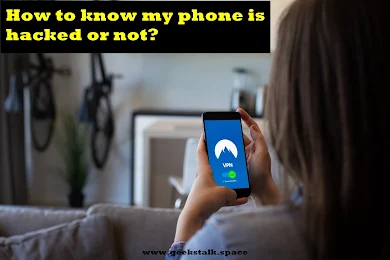 |
| How to know my phone is hacked or not? |
How to know my phone is hacked or not?
Introduction
Smartphones have become an integral part of our lives, containing sensitive personal and financial information. With the growing prevalence of cyber threats, it's crucial to be vigilant about the security of our devices. This article will provide you with a comprehensive step-by-step guide to help you determine (How to know my phone is hacked or not?) if your smartphone has been compromised. By following these steps, you can safeguard your data, privacy, and overall digital well-being.
Step 1:
Monitor Battery Performance: One of the initial signs of a
hacked smartphone is abnormal battery behavior. If your battery drains
unusually quickly, even when you haven't been using your phone extensively, it
could indicate malicious software running in the background. Pay attention to sudden
temperature rises, too, as they may suggest unauthorized processes consuming
system resources.
Step 2:
Observe Data Usage: Excessive data consumption can indicate
a compromised smartphone. Keep track of your data usage patterns and check if
there are any significant deviations. Unexpected spikes in data usage,
particularly when you're not actively using data-intensive apps or browsing the
internet, might suggest the presence of malware or spyware on your device. (
Step 3:
Monitor Unusual App Behavior: Regularly review your
installed applications for any suspicious behavior. Look for unfamiliar or
unrequested pop-ups, excessive ads, or unexpected crashes. Additionally, pay
attention to any new apps that you didn't install yourself, as these could be
potentially malicious. Always verify the legitimacy of an app before
downloading it from unofficial sources or third-party app stores.
Step 4:
Check for Strange Text Messages or Calls: Phishing attempts through
text messages or calls are common techniques used by hackers. Be cautious of
unsolicited messages or calls that ask for personal information or redirect you
to suspicious websites. Avoid clicking on suspicious links or providing
sensitive data in response to such messages.
Step 5:
Analyze Network Traffic: Monitoring network traffic can help identify if your smartphone is compromised. Install a reliable security app that analyzes network activity and alerts you to any suspicious connections (How to know my phone is hacked or not?). Be wary of unsecured Wi-Fi networks, as they can expose your device to potential hacking attempts. Avoid connecting to networks that don't require a password or seem untrustworthy.
Step 6:
Conduct a Security Scan: Regularly scan your device using
reputable antivirus and security applications. These scans can detect and
remove malware, spyware, or other malicious software from your smartphone.
Ensure that your security software is up to date to effectively detect the
latest threats.
Step 7:
Review App Permissions: Check the permissions granted to
your installed apps. Some malicious applications may request unnecessary
permissions that can compromise your privacy and security. Review and revoke
permissions that seem excessive or unrelated to the app's functionality.
If you suspect that your phone may have been hacked, here
are some common signs to look out for:
- Unusual Battery Drain: If your phone's battery is draining faster than usual, even when you're not using it extensively, it could be a sign of malicious software running in the background.
- Increased Data Usage: If you notice a significant increase in your data usage without any corresponding changes in your usage patterns, it could indicate that unauthorized apps or processes are consuming data in the background.
- Slow Performance: Hacked phones often experience slower performance due to the additional processes running in the background. If your phone suddenly becomes sluggish or freezes frequently, it may be compromised.
- Unfamiliar Apps: Check your list of installed apps for any unfamiliar or suspicious applications. Hackers may install malicious apps without your knowledge, so be vigilant and remove any apps you don't recognize.
- Strange Pop-ups or Ads: If you encounter frequent pop-ups, advertisements, or redirects to suspicious websites, it could be a sign of adware or malware on your phone.
- Unexpected Text Messages or Calls: Be wary of unsolicited messages or calls that request personal information or direct you to click on suspicious links. These could be phishing attempts or indicators of a compromised device.
- Overheating: If your phone feels excessively hot, even when you're not using it intensively, it may indicate that malicious software is running in the background and putting a strain on the device's resources.
- Unauthorized Account Access: If you notice any unauthorized access or activity on your online accounts, such as social media or email, it could be a result of a hacked phone compromising your login credentials.
- Unusual System Behavior: Pay attention to any unexpected system crashes, frequent error messages, or settings that change without your input. These can be signs of a compromised device.
- Increased Network Activity: If your phone's network activity is unusually high when you're not actively using data-intensive apps or browsing the internet, it could be a sign of malicious software sending or receiving data in the background.
Conclusion: Securing your smartphone from potential hacking attempts is crucial in today's digital landscape. By following the steps outlined in this guide, you can identify if your smartphone has been compromised and take the necessary actions to protect your data and privacy. Remember to stay vigilant, keep your software updated, and adopt safe browsing habits (How to know my phone is hacked or not?). By implementing these measures, you can safeguard your smartphone and enjoy a secure digital experience.




0 Comments